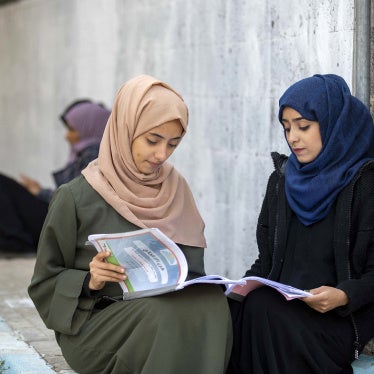The family’s Baghdad apartment would have been warm and welcoming with its dark woods, sofa and small, round stools – traditional furniture in Iraq – if it weren’t for the sense of mourning and horror that shrouded Laila’s parents, sister, and daughter.
Laila’s mother, Um Abbas, dignified in her black abaya, recounted how she and Laila were walking down the street to Um Abbas’ job at an insurance agency when a car pulled up and four men jumped out, grabbed her and Laila by their necks, and forced them into the car. One of the men was dressed like a police officer.
At the station, the officers held the women in separate rooms. Men interrogated Um Abbas, accusing her of convincing her daughter to kill her husband for insurance money – even though her daughter’s husband didn’t have life insurance.
At this point, Um Abbas realized with terror what was happening. Laila’s husband had been stabbed to death with a knife four months earlier. The men wanted to accuse Laila of the murder.
She wondered what was happening to her daughter. Um Abbas wouldn’t learn until several days later was how much more Laila was forced to endure during her “interrogation.”
Laila’s story is sadly familiar according to a new report, “No One is Safe.” More than 1,000 women are in Iraq’s jails and thousands more are in other detention facilities. Many of them allege they have been abused and mistreated. Women are often arrested without evidence. Once behind bars, they are often tortured and sexually abused. Their victimizers are almost never held to account. Judges routinely ignore women’s allegations that security forces abused them, and courts make decisions based on confessions coerced by torture and secret informant testimony.
Unlike Laila, who is Shia, the majority of women we interviewed are Sunni, and their experiences have deepened Sunni feelings of persecution and marginalization under Iraq’s Shia-led government.
Iraq’s prison conditions fed into this divide after the bodyguards of an important Sunni politician were arrested in December, and reports of their abuse spread through Sunni communities. It sparked mass Sunni demonstrations, and the protesters made many demands of Prime Minister Nuri al-Maliki – including the release of women in prison and compensation for female prisoners who were abused. Sadly, al Qaeda has been capitalizing on years of Sunni malcontent, and security forces’ attacks on protests have helped turn them into an insurgency.
But the mistreatment of women behind bars is much more than simply an issue of sectarian politics. Sunni, Shia – there’s a long and troubling history of abuse in Iraq’s prisons.
After Um Abbas and Laila’s first day in detention, the women were transferred to another police station, where they were held in the same room. Then, Um Abbas saw Laila’s bruised face and marks from electric shocks on her fingers. Her daughter had footprint-shaped bruises on her back.
As she told the story, Um Abbas stood up, stomping around the room to illustrate the pattern of footprints on her daughter’s back. Then she began to cry, but tried to conceal it, shielding her face.
Every day, she said, men came for Laila to interrogate her at 5 p.m. Her mother would hear her screaming from the next room. Then men would carry her back around 3 a.m. Um Abbas overheard some officers speak against the beatings. “What will make you stop torturing this girl?” she heard one ask.
After numerous days in detention, Laila made a confession to her mother. She said that, the first night in the police station, a major raped her.
It was too much for Um Abbas to handle. The detention, listening to her daughter being tortured, her worry for the family. Um Abbas snapped and lost control of herself, and began screaming and beating her daughter, letting lose all her rage at the person closest to her. “I felt so angry and helpless,” she said, crying. Now, she’s ashamed and guilt-ridden by her reaction. “I feel awful.”
The next day, Um Abbas was released, she said. Laila was transferred to the central prison for women in Baghdad.
Laila’s family was relatively well-off. They could afford lawyers to defend their daughter, but to no avail. A federal court sentenced Laila to death in August.
Before she was detained, Um Abbas had battled cancer, and it went into remission. Since her ordeal, the cancer has come back. She’s very thin, and has lost her hair, including her eyebrows. She blames the cancer’s return on the stress of Laila’s imprisonment – on what it has done to her daughter and her family.



